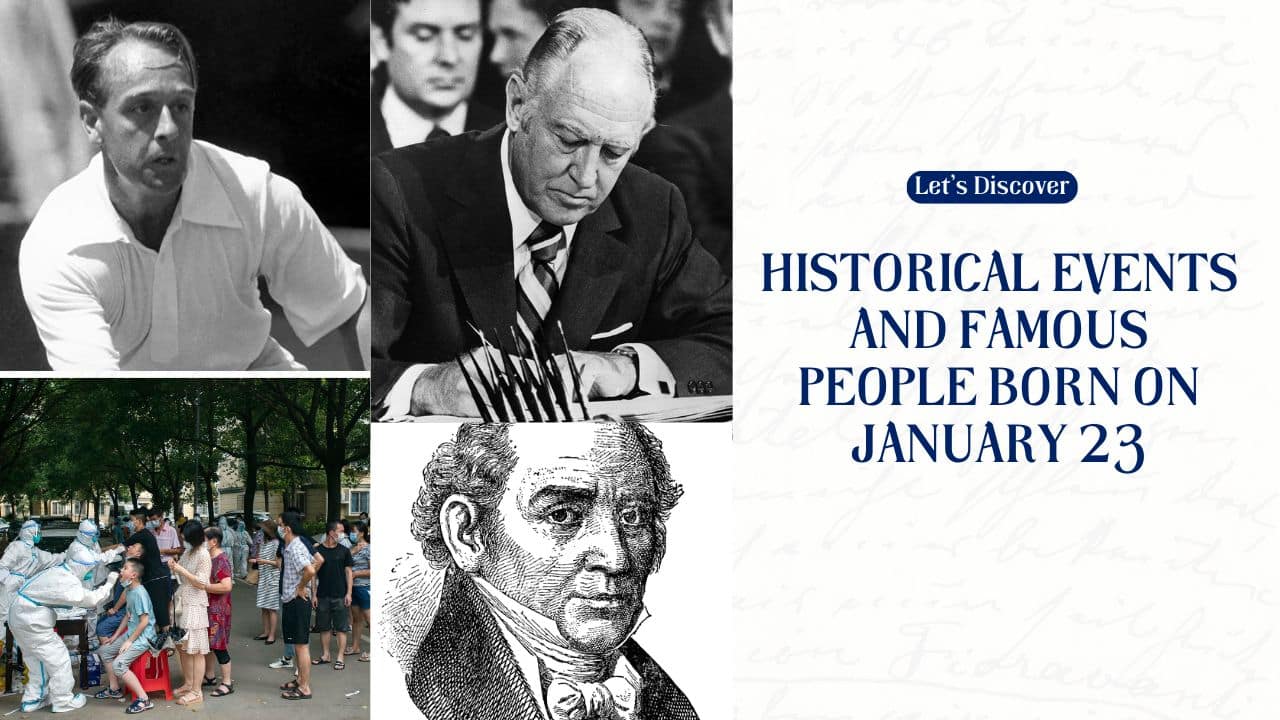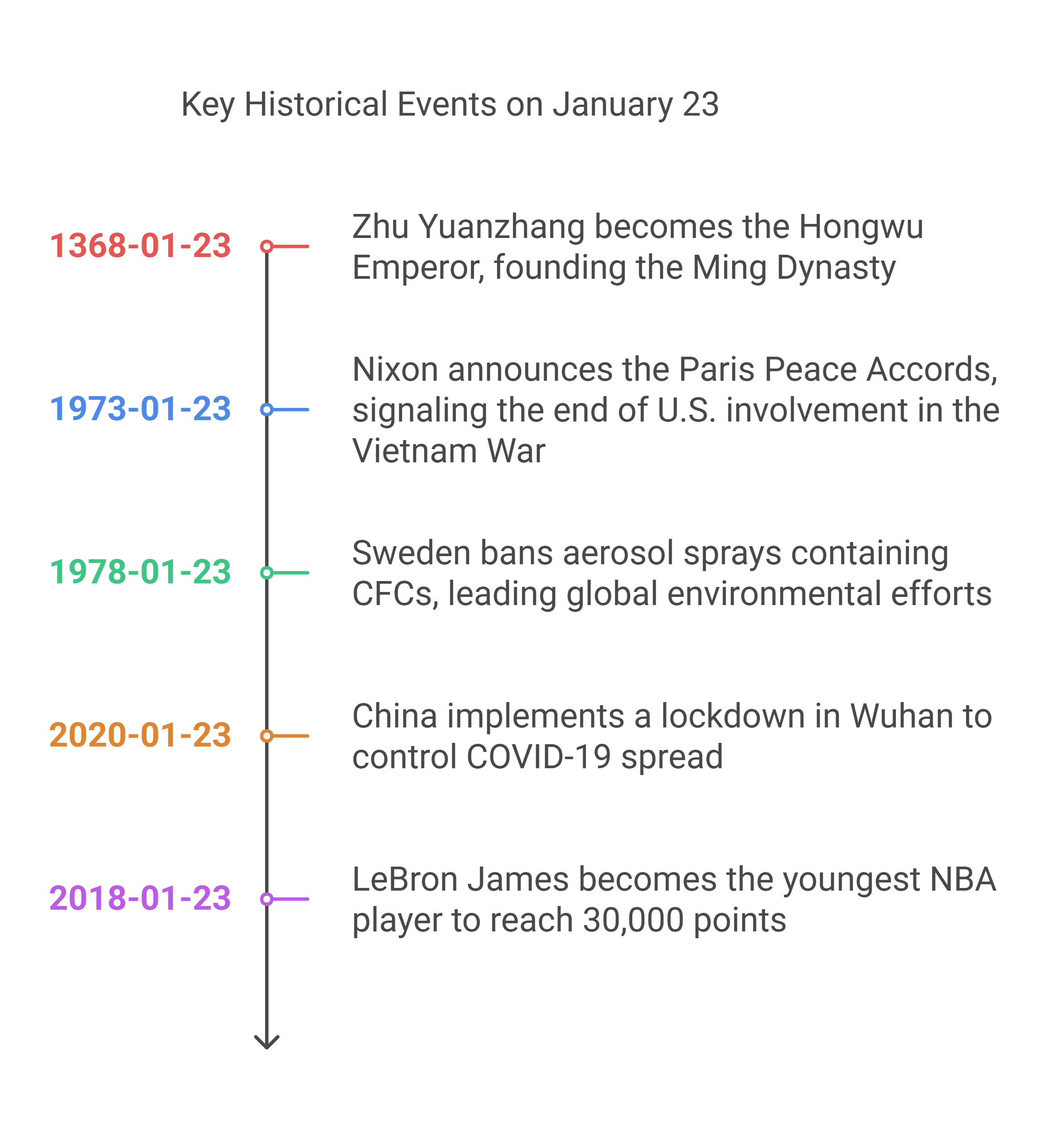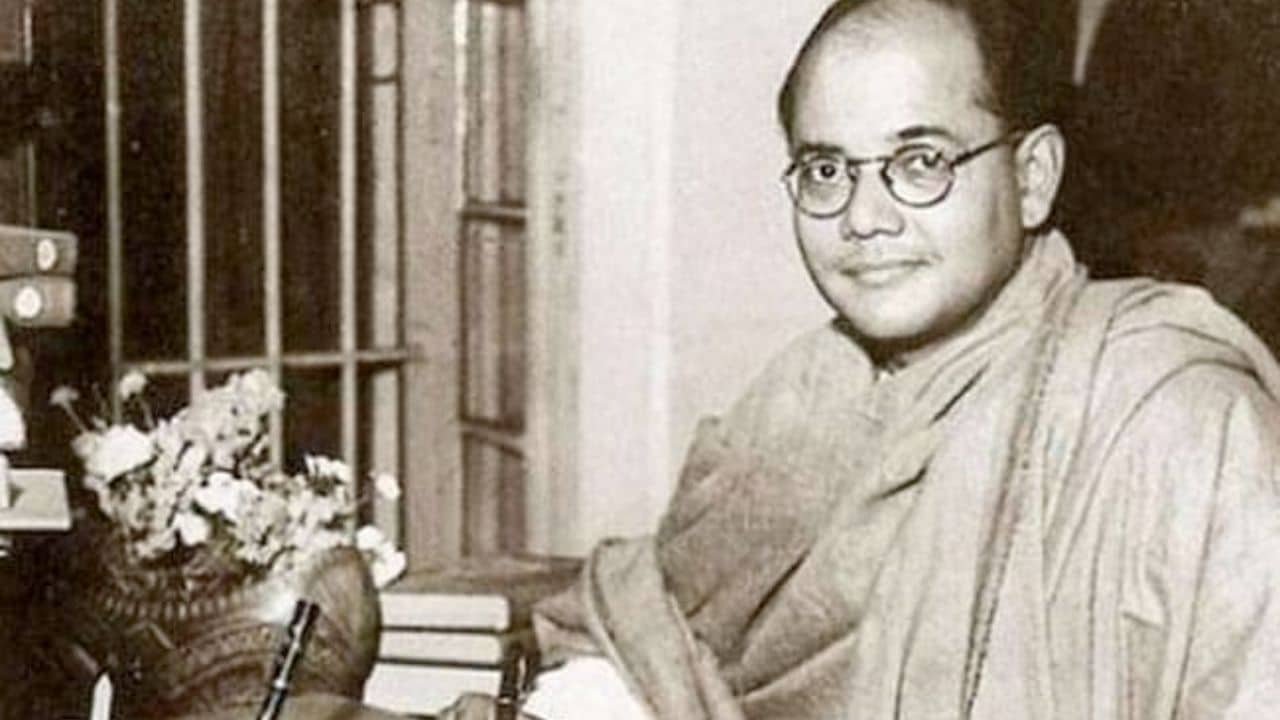Dates carry stories, and January 23 is no exception. Across centuries, this day has witnessed moments that shaped empires, guided nations through conflict, pioneered global environmental awareness, redefined public health strategies, and showcased record-breaking sports achievements.
From a transformative dynastic change in medieval China to a landmark announcement about one of the most polarizing wars in modern history, each event highlights humanity’s capacity for change and resilience.
In this article, we will embark on a chronological journey of the historical events and famous birthdays on January 23. We will begin with the foundation of one of China’s greatest ruling dynasties and move on to examine bold decisions in global affairs, culminating in an extraordinary basketball milestone.
Major Historical Events on January 23
1. 1368: Zhu Yuanzhang Becomes the Hongwu Emperor
The 14th century was a time of great turbulence in China. The ruling Yuan Dynasty, established by the Mongols, was gradually losing its grip due to internal strife, heavy taxation, and widespread discontent.
Against this backdrop, a peasant-turned-rebel leader named Zhu Yuanzhang rose to prominence. Born into poverty, Zhu faced immense hardship in his early years, including natural disasters and the ravages of war. He initially joined a rebel group to help overthrow the Mongol rulers, demonstrating remarkable leadership and strategic prowess.
Coronation Details
By January 23, 1368, after a series of victories, Zhu Yuanzhang successfully drove out the Mongols from key territories and entered the city of Nanjing, which he had proclaimed his base of power. At age 40, he crowned himself the Hongwu Emperor—the founding ruler of the Ming Dynasty.
This ceremony signaled a profound shift in China’s governance, establishing a new ruling house that would endure for three centuries. The Hongwu Emperor quickly moved to rebuild the nation’s economy and infrastructure, implementing policies aimed at reducing corruption, stabilizing the currency, and supporting agricultural development.
Long-Term Impact on China
The Ming Dynasty under Zhu Yuanzhang—and later emperors—restored Han Chinese rule and presided over a flourishing era of art, culture, and maritime exploration. The Hongwu Emperor’s reign was known for:
- Centralized Administration: He reorganized the bureaucratic system and reduced the power of court eunuchs.
- Legal Code: He introduced a new legal code to streamline the justice system.
- Agrarian Focus: Agricultural policies ensured food security, aiming to protect peasants from overtaxation.
His rule set the tone for one of the most influential dynasties in Chinese history, leaving behind a legacy of governance reforms and cultural achievements that continued to shape China for centuries.
2. 1973: US President Richard Nixon Announces Accord to End the Vietnam War
The Vietnam War (1955–1975) stood as one of the most contentious and divisive conflicts of the 20th century. Its origins lay in broader Cold War tensions, as North Vietnam, backed by communist allies, fought against South Vietnam, supported primarily by the United States. Over the years, the war escalated, exacting a heavy toll on soldiers and civilians.
By the late 1960s and early 1970s, the American public grew increasingly weary of rising casualties and the financial burden, fueling protests and a widespread anti-war movement.
The Peace Accord Announcement
On January 23, 1973, President Richard Nixon took to the airwaves to announce that a peace accord had been reached in Paris to end direct U.S. involvement in the Vietnam War. This agreement, later formally signed as the Paris Peace Accords on January 27, included provisions for a ceasefire and the withdrawal of U.S. troops.
Nixon’s announcement was momentous, signaling an imminent conclusion to a conflict that had cost thousands of lives and polarized American society.
Aftermath and Historical Perspective
While the accords temporarily halted open hostilities, internal conflict in Vietnam persisted. Ultimately, by 1975, the fall of Saigon saw North Vietnam fully annex the South, unifying the country under a communist government. The war’s legacy left deep scars on both Vietnam and the United States.
Politically, it reshaped American foreign policy, made the public more skeptical of governmental decisions, and profoundly affected U.S. veterans returning home. The announcement on January 23 remains a milestone, signifying the beginning of the end of the United States’ direct military engagement in Southeast Asia.
3. 1978: Sweden Becomes the First Nation to Ban Aerosol Sprays
During the late 20th century, scientists began to recognize the damage that chlorofluorocarbons (CFCs) in aerosol sprays could cause to the Earth’s ozone layer, a protective shield blocking harmful ultraviolet radiation. Sweden, a country already noted for its progressive stance on ecological matters, took notice of early research linking aerosol use to ozone depletion.
Key Details of the Legislation
On January 23, 1978, Sweden enacted a ban on aerosol sprays containing CFCs, becoming the first nation in the world to do so. This decisive action was rooted in studies showing that emissions from aerosol propellants contributed to ozone layer thinning. Sweden’s pioneering law set a strong precedent, inspiring other countries to follow suit.
Long-Term Environmental Significance
Sweden’s ban was a precursor to a larger global movement, culminating in the Montreal Protocol of 1987, an international treaty aimed at phasing out the production of ozone-depleting substances.
Today, the ban and subsequent treaties are hailed as key environmental success stories. Ozone layer recovery, while ongoing, has shown signs of improvement, proving that collective action can mitigate and even reverse certain human-caused environmental damages.
4. 2020: China Locks Down Wuhan to Control COVID-19
Toward the end of 2019, medical facilities in Wuhan, the capital of Hubei Province in China, noticed a cluster of pneumonia cases with an unknown cause. Within weeks, authorities identified a novel coronavirus—eventually named SARS-CoV-2, causing the disease COVID-19. As infections spread, global concern grew, with Wuhan at the epicenter of this emerging pandemic.
Lockdown Announcement
On January 23, 2020, Chinese authorities implemented an unprecedented lockdown in Wuhan, restricting the movements of approximately 9 million residents. Trains and flights were canceled, public transportation halted, and roads leading out of the city were closed. This drastic measure represented one of the most large-scale public health interventions in modern history.
Outcome and Lessons Learned
While initially criticized by some as a belated response, the lockdown ultimately helped slow the virus’s spread within China. It became a model—albeit a controversial one—for other regions grappling with the virus’s rapid transmission. Over time, many cities worldwide adopted similar measures to varying degrees of strictness.
The Wuhan lockdown underscored the complexities of balancing public health, economic considerations, and individual freedoms in times of crisis. It also accelerated global cooperation on vaccine development and pandemic preparedness, forging a new chapter in how humanity responds to emerging infectious diseases.
5. 2018: LeBron James Becomes the Youngest NBA Player to Reach 30,000 Points
Widely hailed as one of the greatest basketball players of all time, LeBron James entered the NBA in 2003 as an 18-year-old phenomenon straight out of high school. Drafted by the Cleveland Cavaliers, he rapidly ascended to stardom with an unprecedented combination of athleticism, court vision, and leadership. His impact on the game went beyond the court, influencing global sports culture and endorsements.
Reaching 30,000 Points
On January 23, 2018, during a game against the San Antonio Spurs, LeBron made history by scoring his 30,000th point. At 33 years and 24 days old, he became the youngest player ever to reach that milestone—an extraordinary feat shared by only six other NBA legends at the time. Despite the Cavaliers ultimately losing the game (114–102), the moment stood as a testament to LeBron’s consistency and longevity.
Broader Impact on Sports and Culture
LeBron’s influence transcends basketball statistics. His philanthropic endeavors, such as the creation of the I PROMISE School in Akron, Ohio, highlight his commitment to giving back. His social media presence and outspoken advocacy on social and political issues also demonstrate how top athletes can use their platforms to champion broader causes.
By blending sports excellence with an active public voice, LeBron James’s milestone on January 23 remains a symbol of sustained success and societal impact.
Famous Birthdays on January 23
Throughout history, many influential figures share January 23 as their birthday. Below are five noteworthy individuals whose contributions spanned mathematics, music, philosophy, sports, and acting.
1. Netaji Subhas Chandra Bose (1897-?)
Netaji Subhas Chandra Bose was a prominent Indian nationalist leader who played a crucial role in India’s struggle for independence against British rule. He was born on January 23, 1897, in Cuttack, Odisha. Bose was known for his strong leadership, revolutionary ideas, and the formation of the Azad Hind Fauj (Indian National Army – INA) to fight against the British. His famous slogan, “Give me blood, and I will give you freedom,” inspired countless Indians to join the freedom movement. Mysteriously, he is believed to have died in a plane crash on August 18, 1945, though his death remains a subject of speculation and debate.
Major Works and Achievements:
- Formed the Azad Hind Fauj (Indian National Army – INA) in 1942 to fight against British rule.
- Established the Provisional Government of Free India in 1943, which was recognized by several countries.
- Led military campaigns against British forces in India with the help of Japan and Germany.
- Played a key role in strengthening nationalist sentiments and inspiring youth to join the freedom struggle.
Philosophical and Political Ideas:
- Advocated militant nationalism and believed that complete independence could only be achieved through armed struggle.
- Strongly opposed British colonial rule and sought foreign alliances to overthrow it.
- Believed in socialism and economic self-sufficiency, advocating for industrial growth and equal rights.
- Emphasized secularism and unity, urging Indians of all religions and communities to fight together for independence.
2. John Landen (1719–1790)
Born in England in 1719, John Landen exhibited a natural aptitude for numbers from a young age. Although not much is detailed about his formal education, Landen’s self-directed study and intellectual curiosity allowed him to develop a profound understanding of mathematics.
Key Mathematical Contributions
Landen gained recognition for his work in calculus and mathematical analysis. He is most famous for Landen’s Transformations, which significantly influenced later developments in elliptic functions. At a time when calculus was still maturing—building on the foundational insights of Newton and Leibniz—Landen’s innovations offered new ways to approach and simplify complex equations.
Legacy
Although his name may not be as familiar as that of more prominent mathematicians, Landen’s research enriched the field of 18th-century mathematics. By introducing robust analytical techniques, he set the stage for subsequent mathematicians to explore deeper aspects of calculus and its applications.
3. Muzio Clementi (1752–1832)
Muzio Clementi was born in Rome, in the Papal States, in 1752. Recognized as a child prodigy, he received rigorous training in keyboard performance. By the time he was a teenager, his skill at the harpsichord and piano was already drawing attention from Europe’s musical elite.
Major Works and Achievements
Often praised as the “Father of the Piano,” Clementi composed numerous piano sonatas that significantly advanced keyboard technique. His works, including the celebrated “Gradus ad Parnassum,” served as essential study material for aspiring pianists, transforming the way the instrument was played.
Beyond composition, he delved into piano manufacturing, founding businesses to improve the instrument’s design, sound quality, and accessibility.
Influence on Western Classical Music
Clementi’s piano-centric compositions inspired many contemporaries, including Ludwig van Beethoven, who once expressed admiration for Clementi’s style. His legacy remains embedded in classical music pedagogy, where his studies and exercises continue to guide students in developing technical prowess on the piano.
4. Antonio Gramsci (1891–1937)
Antonio Gramsci was born in 1891 in Ales, Sardinia, Italy. Growing up amid poverty, and dealing with health struggles due to a congenital spine deformity, Gramsci developed a keen awareness of social inequities. His experiences as a child led to a lifelong commitment to understanding and critiquing economic and political power structures.
Philosophical and Political Ideas
Gramsci rose to prominence as a Marxist theorist and co-founder of the Italian Communist Party. Among his most influential ideas is the concept of cultural hegemony, which argues that those in power maintain control not merely through force, but by shaping cultural norms and values so that the status quo appears natural or inevitable.
This theory has had lasting reverberations across sociology, cultural studies, and political science.
Imprisonment and Writings
The rise of Benito Mussolini’s fascist regime in Italy led to Gramsci’s imprisonment. During his confinement, he penned his famous “Prison Notebooks,” which delve into politics, history, and philosophy. These notebooks remain pivotal in modern critical theory, influencing how we analyze and critique social structures.
Despite his relatively short life, Gramsci’s intellectual contributions continue to resonate in contemporary discussions about power, ideology, and social change.
5. Adrian Quist (1913–1991)
Born in Medindie, South Australia in 1913, Adrian Quist displayed immense talent on the tennis court early on. His swift footwork, precise volleys, and strong serve-volley style quickly garnered attention on the national circuit.
Major Achievements
Quist’s career included three Australian Championship singles titles, secured in 1936, 1940, and 1948. He was also a formidable doubles player, amassing numerous titles in partnership with legendary teammates. Beyond active competition, Quist served as a tennis analyst, offering insights into strategy and the evolution of the sport.
Contribution to Australian Tennis History
Throughout the mid-20th century, Quist’s success helped elevate Australia’s status in global tennis. His sportsmanship and teaching later influenced players who would continue the tradition of Australian tennis dominance, including the likes of Rod Laver and Ken Rosewall.
6. Mariska Hargitay (born 1964)
Born on January 23, 1964, in Santa Monica, California, Mariska Hargitay is the daughter of 1950s Hollywood icon Jayne Mansfield and Hungarian-born bodybuilder Mickey Hargitay.
Despite her parents’ fame, tragedy struck when Mariska lost her mother in a car accident at a young age. She would, however, grow up to build her own remarkable career in film and television.
Acting Career
Hargitay’s breakthrough role came as Detective Olivia Benson on the long-running series “Law & Order: Special Victims Unit.” Her portrayal of a compassionate yet tough investigator who advocates for survivors of sexual crimes earned her numerous accolades, including a Primetime Emmy Award.
This character has endured for over two decades, becoming an iconic figure and bringing awareness to sensitive, real-life issues.
Humanitarian Work
In 2004, Hargitay founded the Joyful Heart Foundation, dedicated to supporting survivors of sexual assault, domestic violence, and child abuse. Her advocacy efforts have reached legislative circles, as she actively campaigns for improved resources and justice for survivors.
Through her blend of acting success and philanthropic dedication, Mariska Hargitay exemplifies how public figures can leverage their platform for meaningful social change.
Takeaways
From the Hongwu Emperor’s coronation in 1368 to LeBron James surpassing a landmark 30,000 points in 2018, January 23 traverses centuries of human history, encapsulating significant turning points, groundbreaking decisions, and feats of individual brilliance.
This date has been shaped by milestones in governance, peace efforts, environmental stewardship, public health actions, and sports triumphs—an eclectic tapestry revealing our shared resilience and ingenuity.
Ultimately, January 23 underscores the diverse ways our world evolves and how individuals, driven by talent and vision, can influence society. By delving into these stories, we recognize that every date—like every individual—contains a unique power to shape our past, present, and future.
References
- Ming Dynasty History:
- Brook, T. The Confusions of Pleasure: Commerce and Culture in Ming China. University of California Press, 1999.
- Encyclopædia Britannica. “Ming Dynasty.” britannica.com
- Vietnam War and Nixon’s Announcement:
- Karnow, S. Vietnam: A History. Penguin Books, 1997.
- National Archives. “Nixon Announces the Peace Accords.” archives.gov
- Sweden’s Ban on Aerosols:
- National Geographic. “Ozone-Depleting Substances.” nationalgeographic.com
- The New York Times (Historical archives), “Sweden Bans Aerosol Sprays,” 1978.
- Wuhan Lockdown:
- WHO (World Health Organization). “Timeline: COVID-19 Outbreak.” who.int
- BBC News. “Wuhan Lockdown Anniversary.” bbc.com
- LeBron James’s 30,000 Points:
- NBA Official Site. “LeBron James Stats.” nba.com
- Cleveland Cavaliers Archive. nba.com/cavaliers
- Biographical Information:
- John Landen: Oxford Dictionary of National Biography.
- Muzio Clementi: IMSLP Petrucci Library.
- Antonio Gramsci: Hoare, Q. & Nowell Smith, G. Selections from the Prison Notebooks. International Publishers, 1971.
- Adrian Quist: Tennis Australia Archives.
- Mariska Hargitay: Joyful Heart Foundation Official Website.




































